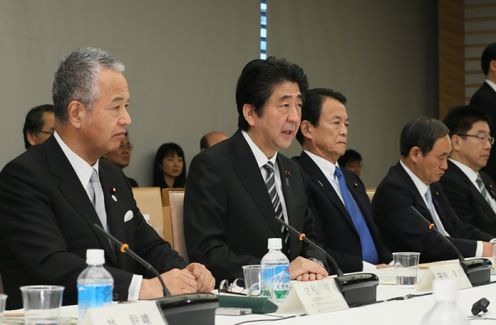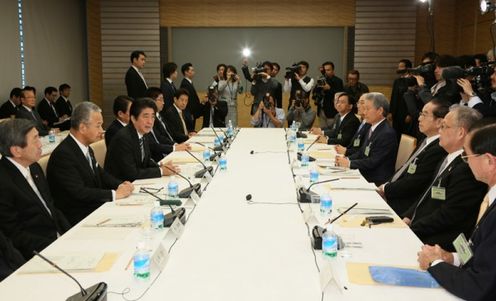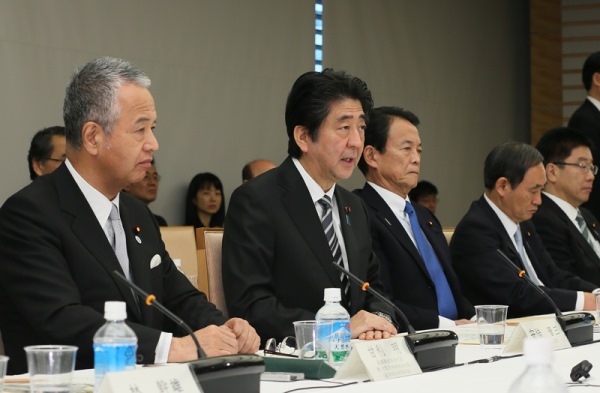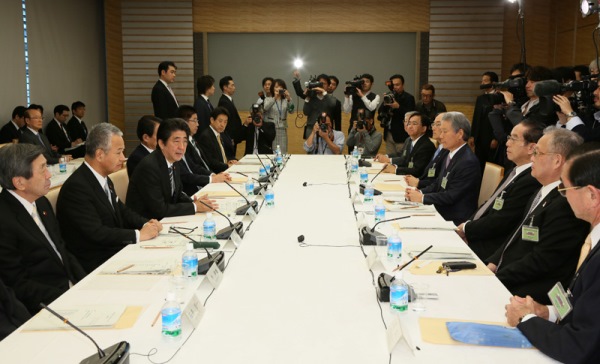Home > News > The Prime Minister in Action > November 2015 > Public-Private Dialogue towards Investment for the Future
The Prime Minister in Action
Public-Private Dialogue towards Investment for the Future
November 26, 2015

Photograph of the Prime Minister making a statement (1)

Photograph of the Prime Minister making a statement (2)
[Provisional Translation]
Prime Minister Shinzo Abe held the third meeting of the Public-Private Dialogue towards Investment for the Future at the Prime Minister's Office.
During the dialogue, discussion took place on investment trends and issues related to energy, and on approaches for industry to expand investment and increase wages.
Based on today’s discussion, the Prime Minister said,
“Thank you for today’s spirited discussion. We heard from Mr. Wada, Mr. Murakami, and Mr. Enatsu about progressive initiatives taking place in the private sector with regards to energy and energy conservation.
The Abe Cabinet emphasizes speed. I hope to decide on a policy direction today at this venue based on the proposals and issues.
We will link restrictions on energy and environmental pollution to an increase in new investment.
The Energy Conservation “Top Runner Program” for the manufacturing industry will be extended to the retail and service industries before the end of this fiscal year, and within three years’ time it will expand to include 70% of the energy consumed by all industries. At the same time, we will provide solid support to the energy conservation needs of small- and medium-sized enterprises, such as conducting local energy conservation diagnoses.
We will encourage homes to be more energy efficient. The “Top Runner Program” will apply to incandescent lamps starting next fiscal year. By 2020, the majority of new homes constructed by homebuilders will use net zero energy, while the number of remodeling projects to improve energy efficiency will be doubled.
We will fundamentally increase incentives to conserve electricity. By 2017, we will create a negawatt transactions market, making use of residential photovoltaic power generation and IoT, where electricity conserved can be bought and sold. Toward this end, we will create rules for transactions between businesses and create telecommunications standards for remote control operation of energy equipment during the next fiscal year.
I would like all ministers concerned to immediately begin work on designing specific systems and programs. I ask that the Minister of Economy, Trade and Industry create a detailed system for increasing energy generation efficiency and lowering the carbon footprint of power producers and small businesses by next spring.
Additionally, today Keidanren Chairman Sakakibara, and other members of business and industry, shared with us their very positive attitude and proactive commitment.
Capital investment and wage increases will largely determine if we can establish a positive economic cycle.
Capital investment is expected to reach around 80 trillion yen by FY2018 if the required measures are implemented. This is a very ambitious outlook to be achieved in the next three years, as this capital investment is needed for us to achieve a GDP of 600 trillion yen.
As for next spring’s wage increases, businesses have shown a proactive stance and have indicated they will lobby for positive discussions, and it is anticipated that companies that have increased their profits will increase wages at a rate that exceeds this year with an eye on 3% nominal growth.
I highly commend the policies shared with us by industry. I expect that these policies will be carried out fully.
The issues raised by industry will be addressed immediately and effectively by the government.
Regarding corporate tax reform, it is certain that the range of reduction of the corporate tax rate will be further decreased in FY2016, paving the way to a reduction in the 20%~29% range at an early date.
We will also work on regulatory reform, which stands as a barrier to investment, and on encouraging greater capital investment by regional small- and medium-sized enterprises.
I ask that industry work with us in securing the financial base for corporate tax reform. Thank you.”


